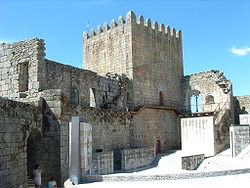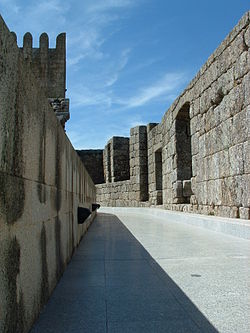
São Jorge Castle, sometimes known in English as Saint George's Castle, is a historic castle in the Portuguese capital of Lisbon, located in the freguesia of Santa Maria Maior. Human occupation of the castle hill dates to at least the 8th century BC while the oldest fortifications on the site date from the 2nd century BC. The hill on which Saint George's Castle stands has played an important part in the history of Lisbon, having served as the location of fortifications occupied successively by Phoenicians, Carthaginians, Romans, and Moors, before its conquest by the Portuguese in the 1147 Siege of Lisbon. Since the 12th century, the castle has variously served as a royal palace, a military barracks, home of the Torre do Tombo National Archive, and now as a national monument and museum.

The Castle of Santa Maria da Feira is a Portuguese castle in the municipality of Santa Maria da Feira, district of Aveiro. Emblematic of Portuguese medieval military architecture, the Castle of Santa Maria da Feira is one of the monuments that best reflects the diversity of defenses used during the Middle Ages, having been instrumental in the process of Reconquista and autonomy of the County of Portugal. It has been listed as a National monument since 1910.

The Castle of Beja is a medieval castle in the civil parish of Beja, municipality of Beja, Portuguese district of Beja.
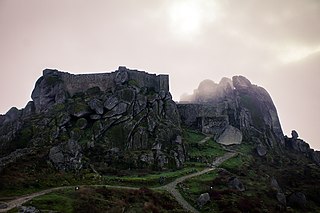
The Castle of Monsanto is a medieval castle located in the civil parish of Monsanto e Idanha-a-Velha, in the municipality of Idanha-a-Nova, Portuguese district of Castelo Branco.

The Castle of Moreira de Rei is a well-preserved medieval castle located in the civil parish of Moreira de Rei, in the municipality of Trancoso, Portuguese district of Guarda.
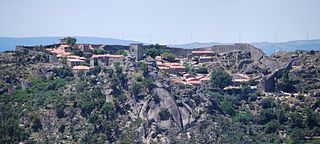
The Castle of Sortelha (Portuguese: Castelo de Sortelha is a castle in the civil parish of Sortelha in the municipality of Sabugal in the Portuguese Centro region, classified as a National Monument.
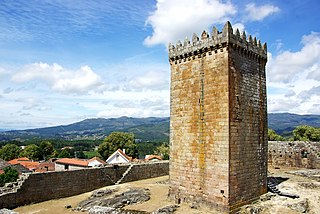
The Castle of Melgaço is located in Vila parish, Melgaço municipality, Viana do Castelo district, in Portugal.
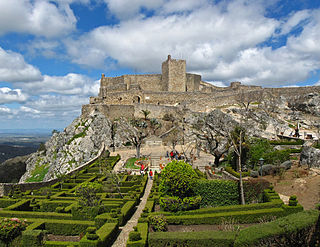
The Castle of Marvão is a well-preserved medieval castle located in the civil parish of Santa Maria de Marvão, in the municipality of Marvão, Portuguese district of Portalegre.

The Castle of Ouguela is a medieval castle erected in the civil parish of São João Baptista, municipality of Campo Maior, in the Portuguese district of Portalegre.

The Castle of Vinhais is a medieval castle located in the civil parish of Vinhais, municipality of Vinhais, Portuguese district of Bragança.

The Castle of Pena de Aguiar is a medieval castle, alternately the Castle of Aguiar da Pena, situated in the civil parish of Telões, in the municipality of Vila Pouca de Aguiar, in the Portuguese district of Vila Real.

The Castle of Óbidos is a well-preserved medieval castle located in the civil parish of Santa Maria, São Pedro e Sobral da Lagoa, in the municipality of Óbidos, Portuguese District of Leiria.

The Castle of Santo Estêvão is a medieval castle located in the civil parish of Santo Estêvão, municipality of Chaves, in the Portuguese district of Vila Real. Located in a dominant position over the village, the castle is within walking distance of the course of the river Tamega and the border with Spain.
The Castle Hill of Miranda, also known as the Fortress Hill,, is a medieval castle located in the village of Outerio in the district of Bragança, Portugal.
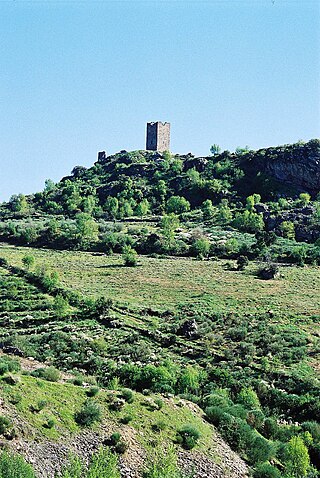
The Castle of Penas Roias is a Portuguese medieval castle in the civil parish of Penas Roias, municipality of Mogadouro, in the Portuguese of district of Bragança.

The Castle of Bragança is a well-preserved medieval castle located in the historic center of the city of Bragança, district of Bragança, Portugal.

The Castle of Serpa is a medieval castle located in the civil parish of Serpa, in the municipality of Serpa, Portuguese district of Beja.

The Castle of Tavira is a medieval castle located in the parish of Santiago, Tavira municipality, Faro district of Portugal. In a dominant position over the mouth of the river Gilão, the settlement has developed as an important sea port since antiquity, with its predecessors dating back to the 8th century BC, passing through the hands of Phoenicians, Greeks, Celts, Carthaginians, Romans, Moors and the Portuguese crown.
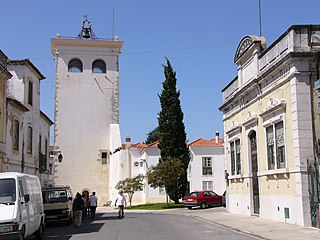
The Castle of Santarém is a medieval castle located in the city of Santarém in the Portuguese county and district of Santarém.

The Castle of Monforte, also referred to as Castelo de Monforte de Rio Livre, is a medieval castle located in the Águas Frias parish, Monforte de village, Chaves municipality in Vila Real district of Portugal.


